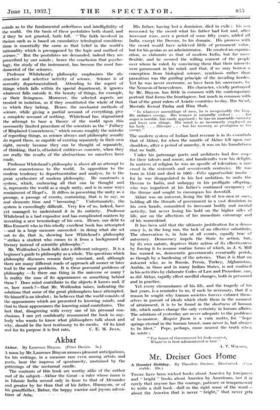Akbar
Akbar. By Laurence Binyon. (Peter Davies. 5s.) • A Boole by Mr. Laurence Binyon arouses pleasant anticipations, for his writings, in a measure rare even among artists and poets, bear the impress of spontaneity, unstained by the gutterings of the nocturnal candle.
The contents of this book are worthy alike of the author and of its subject—Akbar the Great—a ruler whose name is in Islamic India second only in fame to that of Alexander and greater by far than that of his father, Htunayun, or of his grandfather, Babur, the happy warrior and joyous adven- turer of 'Asia; - - - His father, having lost a dominion, died in exile : his son recovered by the sword what his father had lost and, after incessant wars, over a period of some fifty years, added all India, except the Deccan, to his domain. His prowess with the sword would have achieved little of permanent value, but for his genii's as an adi ll i ll istrator. He created an organiz- ation, as elaborate as that of modern India, but far more flexible, and he secured the willing consent of the people over whom he ruled, by convincing them that their interests were paramount in his mind, and that, if we may borrow a conception front biological science, symbiosis rather than parasitism was the guiding principle of the invading hordes. Yet he was never overcome, as have been his successors, by the Nemesis of benevolence. His character, vividly portrayed by Mr. Binyon, has little in common with the contemporary portrait that forms the frontispiece, but much in co lllll ton with that of the great rulers of Asiatic countries to-day, Dm Sa'nd, Mustafa Kemal Pasha and Rim a Shah.
" In whatever assemblage of men, he is recognizably the king. Be radiates energy. Big temper is naturally violent; . . liii
::::yrjoisvetserprlieb,nk., .,11= easily appeased 1,1we has an insatiablel )pti•ot3treiTi.,1 y5
his body . . . illiterate • . but his memory as prodigious as Ins energy."
The modern system of Indian land revenue is in its essentials that of Akbar, for when the mantle of Akbar fell upon our shoulders, after a period of anarchy, it was on his foundations that we built.
Ulider his patronage poets and architects had free scope for their talents and music, and handicrafts were his delight. In matters of religion he was an apostle of toleration, a rare creed in the sixteenth and seventeenth centudes. He was born in 1542 and died in 1605—Fear opportunitale mortis for he was disappointed in his last ambition, to unite the Deccan to India, and unhappy in his profligate offspring. who was impatient at his father's continued occupancy of the throne and sought to encompass his downfall.
Akbar was an autocrat, living the life of ten men at once, holding all the threads of government in a vast dominion in his own hands, committed to incessant bodily and mental activity, but never losing his hold on the higher sides of life, nor on the affections of his immediate entourage and of his womenkind.
It has been said that the ultimate justification for a demo- cracy is, in the long run, the lack of an effective substitute. The observation is, in Asia at all events, equally true of autocracy. Democracy impels the State to action, but, by its own nature, deprives State action of its effectiveness by forcing it to assume routine forms of which, as 1 S Mill has warned us, democratic governments eventually perish, as though by u hardening of the arteries. Thus it is that au autocrat who, as in Russia, Persia, Turkey, Afghanistan, Arabia, in Siam and in many Indian States, is not confined in his activities by elaborate Codes of Law and Procedure, can, as did Akbar, rapidly effect needful changes, both in personnel
and in practice.
Vet every circumstance of his life, and the tragedy of his last years, is a reminder to us, if such be necessary, that if a reason be sought why human societies forever exhaust them- selves in pursuit of ideals which elude them in the moment of attainment, it is to be found in the shortness of human life, which makes change the only certainty in human affairs. - The solutions of yesterday are never adequate to the problems of to-morrow. Respire finest is a vain motto, for " hope springs eternal in the human breast, man never is, but always to be blest." Pope, perhaps, came nearest the truth whea
he wrote : " For forma of Government lot fools contest. Whate'er is best administered is best."
A. '1'. Wo.sim


































 Previous page
Previous page